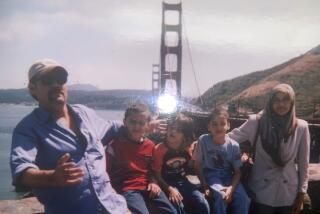U.S. Arrests 397 in Baath Stronghold
- Share via
BAGHDAD — American forces hunting for senior Baath Party officials and remnants of the pro-Saddam Hussein Fedayeen fighters rounded up about 400 suspects and an undisclosed number of illegal weapons over two days, the U.S. military said Wednesday.
Dubbed “Peninsula Strike,” it was the largest operation by U.S. occupation troops since the end of major combat activities in Iraq in late April. Air, ground and riverboat patrols isolated a mainly Sunni Muslim triangle northwest of Baghdad in the wake of what the military is calling “organized” attacks on U.S. soldiers in the past two weeks.
U.S. officials say the country is under control but that pockets of resistance remain. One U.S. spokesman, Army Col. Rick Thomas, characterized the pro-Hussein elements as increasingly desperate because they “have no future anywhere.... I promise you they have no future inside Iraq.”
American officials did not say which senior Baath Party officials might be hiding in the search area, centered on the Tigris River town of Thuluya, but indicated that they would be sifting through the 397 suspects to see if any are wanted by the U.S. occupation administration.
At least one group of Iraqis engaged U.S. forces at Balad, about 50 miles north of Baghdad, and then tried to escape on a Tigris River boat, Thomas said, but they were tracked down from the air and captured.
Officials described two major phases of the operation that began Tuesday. The first involved moving soldiers and equipment into position to cut off a triangle along the Tigris. In the second, they launched raids using assault teams, ground attack squads, river patrol boats and Iraqi police against specific targets inside the area.
Checkpoints and patrols were maintained over the past two days to capture anyone trying to flee.
“The success of Operation Peninsula Strike will help move the Iraqi people one step closer to a safe, secure and free country,” a statement by U.S. Central Command said.
A pro-U.S. politician, Iraqi National Congress leader Ahmad Chalabi, has alleged that Hussein could be hiding in the area. There is also increasing speculation that senior Baath Party officials may be paying fighters who attack Americans.
In one such recent attack, a rocket-propelled grenade killed a U.S. soldier Tuesday afternoon in Baghdad.
Chalabi said Tuesday in New York that Hussein was spotted northwest of Baghdad as recently as three weeks ago and that he has been paying a bounty for killing U.S. troops. He repeated the statement Wednesday on PBS’ “Newshour.”
“Saddam did not have a military plan to confront the U.S. But he apparently had a post- defeat plan. Saddam has organized a network of his supporters whom he can amply pay to make operations against United States forces, and they are doing it,” Chalabi said.
“I was disturbed by the report that the U.S. soldier was killed in an ambush in Baghdad,” he added.
Briefing reporters earlier this week, Thomas said U.S. forces are hunting Hussein relentlessly.
“It is certainly within our priorities of things to do, to get information, to get out and get Saddam Hussein, assuming he is alive, and his family,” Thomas said.
Referring to the American most-wanted list of 55 ex-regime officials he added: “Our intent is to get 55 of 55. We have 30 now. It is an intensive effort.”
In another development Wednesday, the U.S. military said it is investigating whether its troops might be responsible for the death of a prisoner of war.
The corpse of a 52-year-old Iraqi was found at a camp run by the 1st Marine Division near Nasiriyah, officials said. The Naval Criminal Investigative Service is involved in the case.
Military officials would not say how the man died or identify him.
They also did not say whether other prisoners might be responsible for the death.
*
Times staff writer Robin Wright in Washington contributed to this report.
More to Read
Sign up for Essential California
The most important California stories and recommendations in your inbox every morning.
You may occasionally receive promotional content from the Los Angeles Times.












